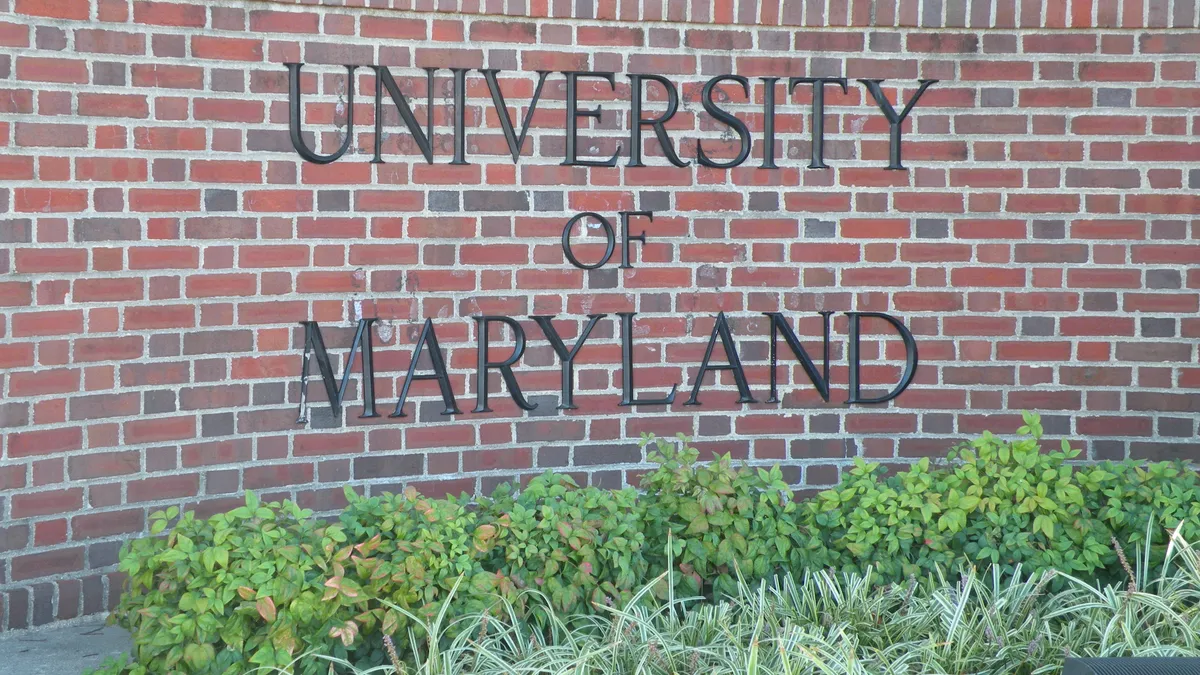UPDATE: July 1, 2019: The Middle States Commission on Higher Education (MSCHE) announced Friday that the University of Maryland could lose its accreditation over concerns that it may not be compliant with governance, leadership and administration standards, The Baltimore Sun reported.
MSCHE chair Margaret McMenamin wrote in an email that the team placed U of Maryland on warning after identifying issues with the “transparency of its governance structure” during an accreditation review. U of Maryland has until March 2020 to implement a governance structure that “outlines roles, responsibilities, and accountability for decision making,” MSCHE wrote in a statement. It will retain its accreditation while on warning.
In a statement issued Friday, University System of Maryland (USM) leaders and U of Maryland President Wallace Loh said they are “committed to working” to meet the accreditor’s standards by the review date.
Dive Brief:
-
The MSCHE placed U of Maryland’s accreditation under review last year following the death of a student-athlete and subsequent internal turmoil on the College Park campus, according to The Sun.
-
A MSCHE spokesperson told The Sun the death of one of the university’s football players spurred the commission to move for a review.
-
Loss of accreditation, which was reaffirmed for an eight-year period last year, would mean students can't receive federal financial aid.
Dive Insight:
The decision by the Middle States Commission is just the latest turn in a series of events that followed the death of 19-year-old Jordan McNair as a result of heatstroke sustained during a workout last year.
A subsequent set of investigations found dysfunction in the athletic department, which was brought to light in a 198-page report. Prepared by an outside commission, the report characterized the department as an environment where "problems festered because too many players feared speaking out."
The report spurred a chain of personnel reactions, which revealed a rift between the USM Board of Regents and academic and athletic administrators. It also raised concerns over issues of governance and academic freedom.
Amid the fallout, Loh announced his retirement, while the board said they'd reinstate head football coach DJ Durkin and the athletic director, Damon Evans. The decision to bring back Durkin while Loh would retire, which some faculty called "forced," was met with swift opposition. Loh fired Durkin the next day.
The board's chairman also stepped down, effectively bolstering the role of university president in the relationship with the board, The Chronicle of Higher Education contends. Loh previously was made aware that if he didn't bring Durkin back, he would be immediately fired by the board.
U of Maryland is the flagship college of USM, which is made up of 12 institutions. The university enrolled more than 29,000 undergraduate and 10,000 graduate students in the fall of 2017. It garnered $545.3 million in research awards in the fiscal year 2018. More than two-thirds of its students are offered financial aid annually while one-third receive federal loans, The Sun reported, citing College Board and U.S. Education Department data.
Colleges are being held accountable for how they handle controversy and misconduct on campus, but the stakes are high. Key leadership resignations, multi-million-dollar fines and settlements, and now potential loss of accreditation have all made headlines recently amid highly publicized scandals within universities.
Meanwhile, the nature of accreditation continues to be debated. Supporters of a new approach say accreditors should drop their pass/fail framework and instead base standards and repercussions on the individual institution or its type, Education Dive reported earlier this year.
Low academic performance, high student loan default rates and loss of federal recognition for an accreditor are among the common reasons why some colleges have recently lost their accreditation. Probation is another tool that gives colleges the opportunity to correct missteps without cutting off student access to critical federal funding.
In 2015, the University of North Carolina at Chapel Hill was put on a year of probation — though it remained accredited — in response to a scandal over employees directing some student-athletes toward classes with questionable academic integrity.
And in December 2016, the University of Louisville was put on probation by its accreditor for a year after the state's governor announced plans to replace the institution's board of trustees. The accreditor, the Southern Association of Colleges and Schools, said the move raised concerns of political influence in the public college, according to the Courier Journal










